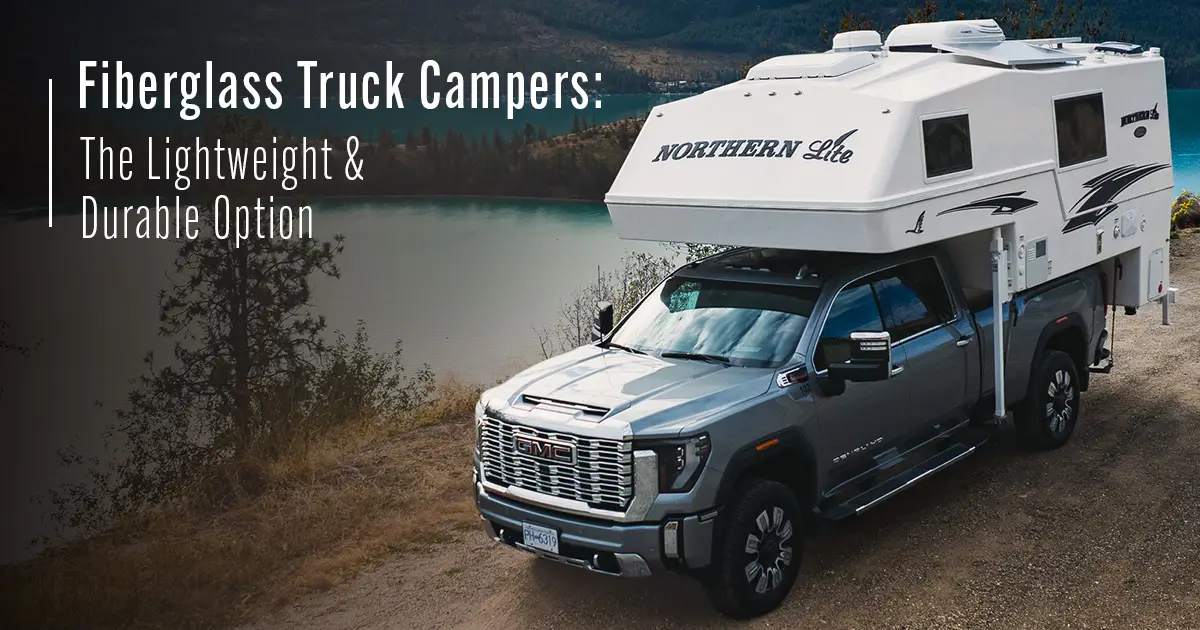
Fiberglass Truck Campers: The Lightweight, Durable RV Option You Shouldn’t Overlook
If you’re exploring the world of truck campers, you’ve probably noticed fiberglass models popping up more often. They stand out right away—sleek, rounded, and almost boat-like compared to the boxy look of traditional campers. And that’s no coincidence. Fiberglass truck campers are built differently, and that difference comes with some serious benefits.
Whether you’re new to RV life or looking to upgrade, here’s why a fiberglass truck camper might just be the best move you make for your adventures.
What Is a Fiberglass Truck Camper?
Traditional campers usually have a wood or aluminum frame wrapped in aluminum siding or composite panels. A fiberglass truck camper, on the other hand, is made from one or two solid molded fiberglass shells that are sealed together—similar to how a speed boat or sailboat is built.
That seamless construction isn’t just for looks. It makes the camper stronger, lighter, and far more resistant to leaks. If you’ve ever worried about water damage in your RV, fiberglass campers are a breath of fresh air.
Benefits of Fiberglass Truck Campers
- Long-Lasting Durability
Fiberglass is tough stuff. Unlike wood, it won’t rot, and unlike aluminum, it won’t dent easily. Scratches from branches or gravel roads are usually minor, and with a little care, a fiberglass truck camper can last for decades. This makes them one of the most durable RV options on the market. - Leak Resistance
Water damage is the nightmare of every RV owner. Because fiberglass campers are built with fewer seams, there are fewer opportunities for water to sneak in. That means less maintenance and a lot more peace of mind when camping in rainy conditions. - Lightweight Design
Looking for a lightweight truck camper that won’t overload your rig? Fiberglass is the way to go. These campers are generally lighter than wood-and-metal builds, which is a big win for fuel economy and for people with half-ton or mid-size trucks. Lighter weight also means easier handling on rough roads. - Aerodynamics & Good Looks
Let’s be honest—fiberglass campers just look sharp. Their rounded shapes are not only stylish but also more aerodynamic, cutting down on wind resistance during long highway drives. Over time, that can even help save on fuel. - Low Maintenance
If you want a low-maintenance camper, fiberglass is tough to beat. No wood rot, fewer seams to reseal, and minimal exterior upkeep. A wash, an occasional wax, and routine checks on seals are usually enough to keep things in top shape.
Who Should Consider a Fiberglass Truck Camper?
These campers aren’t for everyone, but they’re ideal for certain types of adventurers:
- Weekend campers who want something reliable and ready to roll at a moment’s notice.
- Overlanders who need a rugged, durable RV option that can handle off-grid trails.
- Minimalists who value simplicity and efficiency over massive floorplans.
- Drivers of mid-size trucks looking for a camper that fits within payload limits.
If you prioritize durability, low maintenance, and a lighter load, a fiberglass truck camper is a smart choice.
Are There Any Downsides?
Like anything, fiberglass campers have trade-offs. They usually cost more upfront than traditional campers, and because the manufacturing process is specialized, there are fewer floorplans and brands to choose from. Repairs, while not common, can also be trickier if you do manage to crack the shell.
That said, the long-term savings in maintenance and the extended lifespan often make fiberglass campers a better value overall.
Why Choose a Fiberglass Truck Camper?
At the end of the day, fiberglass truck campers combine durability, style, and practicality in a way that few other RVs can match. They’re lightweight, aerodynamic, and built to resist the water damage that plagues so many campers.
If you’re shopping for a durable RV option that can go the distance with minimal fuss, a fiberglass truck camper deserves a spot at the top of your list. Whether you’re chasing weekend getaways, tackling off-grid overlanding routes, or just looking for a dependable, low-maintenance camper, fiberglass checks all the boxes.
Next time you spot one at a campground or trailhead, you’ll understand why its owner looks so relaxed—they’re enjoying all the benefits of fiberglass without the usual RV headaches.